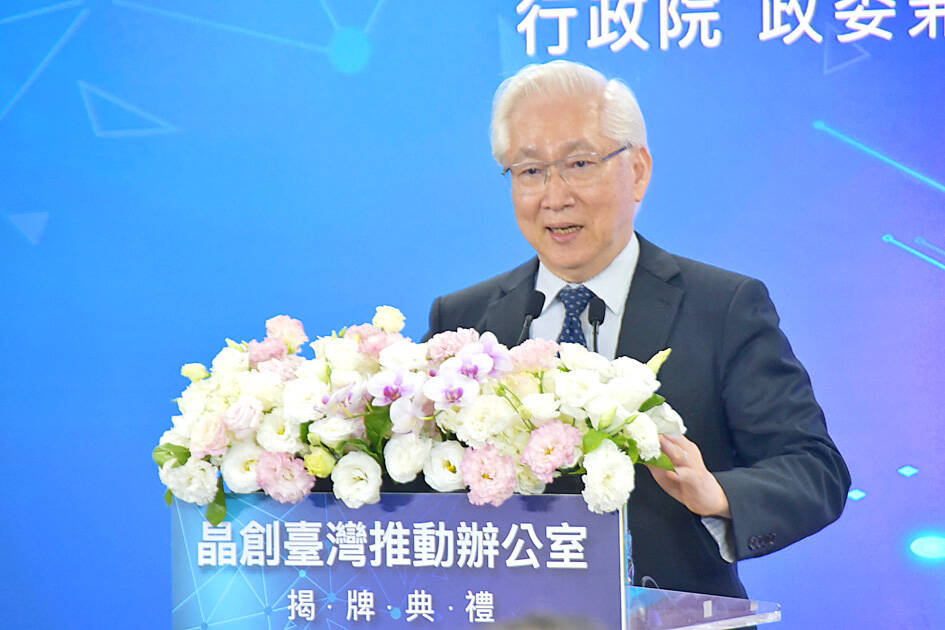Taiwan and Australia yesterday signed a scientific and technological cooperation agreement, the National Science and Technology Council said.
Representative to Australia Douglas Hsu (徐佑典) and Australian Representative in Taiwan Robert Fergusson signed the Science and Technology Arrangement in Canberra after six months of discussions and planning, the council said.
Council Minister Wu Tsung-tsong (吳政忠) proposed the partnership when visiting senior officials at the Australian Department of Industry, Science and Resources (DISR) in October last year, it said.

Photo: Wu Po-hsuan, Taipei Times
The DISR and Australian Department of Foreign Affairs and Trade officials witnessed the signing, while representatives from the council, the Ministry of Foreign Affairs and the Australian Office, Taipei, participated online, the council said.
The agreement consists of 22 research cooperation and talent exchange programs, focusing on four main areas: manufacturing information and communications technology, semiconductor and critical technology supply chain resilience, biotechnology, and the net zero transition, it said.
The arrangement is an upgrade from a memorandum of understanding (MOU) Taipei and Canberra signed in 2012, which demonstrated the importance both parties attach to bilateral cooperation in scientific research, Hsu said.
Under the agreement, the two sides would expand cooperation with the aim of further contributing to international society, he said.
DISR General Manager Richard Samuels said he hoped that the deal would help bolster relations between Taiwan and Australia through concrete actions, the council said.
Australia is the fifth country to sign such an agreement with Taiwan, following the US, Germany, France and Canada, it said.
Taiwan has made concrete progress under the deals, including holding the first Science and Technology Cooperation Dialogue with the US in May last year and a scientific research conference with France last month, the council said.
Taiwan and Germany are cooperating in many fields, such as semiconductors and lithium batteries, it said, adding that the two sides are scheduled to hold high-level talks in Germany later this year to review the outcomes of the arrangement.
Separately, Taiwan and Australia last month signed an MOU on transport safety and information exchanges, the Taipei Economic and Cultural Office in Australia said.
The two sides have long been cooperating on aviation safety, with the Aviation Safety Committee signing a similar MOU with the Australian Bureau of Air Safety Investigation in 1998, Hsu said.
The updated MOU expands the scope of cooperation from civil aviation to include maritime and railway transportation safety, including accident investigation, safety research and technical training, he said.

Taiwan has received more than US$70 million in royalties as of the end of last year from developing the F-16V jet as countries worldwide purchase or upgrade to this popular model, government and military officials said on Saturday. Taiwan funded the development of the F-16V jet and ended up the sole investor as other countries withdrew from the program. Now the F-16V is increasingly popular and countries must pay Taiwan a percentage in royalties when they purchase new F-16V aircraft or upgrade older F-16 models. The next five years are expected to be the peak for these royalties, with Taiwan potentially earning

STAY IN YOUR LANE: As the US and Israel attack Iran, the ministry has warned China not to overstep by including Taiwanese citizens in its evacuation orders The Ministry of Foreign Affairs (MOFA) yesterday rebuked a statement by China’s embassy in Israel that it would evacuate Taiwanese holders of Chinese travel documents from Israel amid the latter’s escalating conflict with Iran. Tensions have risen across the Middle East in the wake of US and Israeli airstrikes on Iran beginning Saturday. China subsequently issued an evacuation notice for its citizens. In a news release, the Chinese embassy in Israel said holders of “Taiwan compatriot permits (台胞證)” issued to Taiwanese nationals by Chinese authorities for travel to China — could register for evacuation to Egypt. In Taipei, the ministry yesterday said Taiwan

Taiwan is awaiting official notification from the US regarding the status of the Agreement on Reciprocal Trade (ART) after the US Supreme Court ruled US President Donald Trump's global tariffs unconstitutional. Speaking to reporters before a legislative hearing today, Premier Cho Jung-tai (卓榮泰) said that Taiwan's negotiation team remains focused on ensuring that the bilateral trade deal remains intact despite the legal challenge to Trump's tariff policy. "The US has pledged to notify its trade partners once the subsequent administrative and legal processes are finalized, and that certainly includes Taiwan," Cho said when asked about opposition parties’ doubts that the ART was

If China chose to invade Taiwan tomorrow, it would only have to sever three undersea fiber-optic cable clusters to cause a data blackout, Jason Hsu (許毓仁), a senior fellow at the Hudson Institute and former Chinese Nationalist Party (KMT) legislator, told a US security panel yesterday. In a Taiwan contingency, cable disruption would be one of the earliest preinvasion actions and the signal that escalation had begun, he said, adding that Taiwan’s current cable repair capabilities are insufficient. The US-China Economic and Security Review Commission (USCC) yesterday held a hearing on US-China Competition Under the Sea, with Hsu speaking on